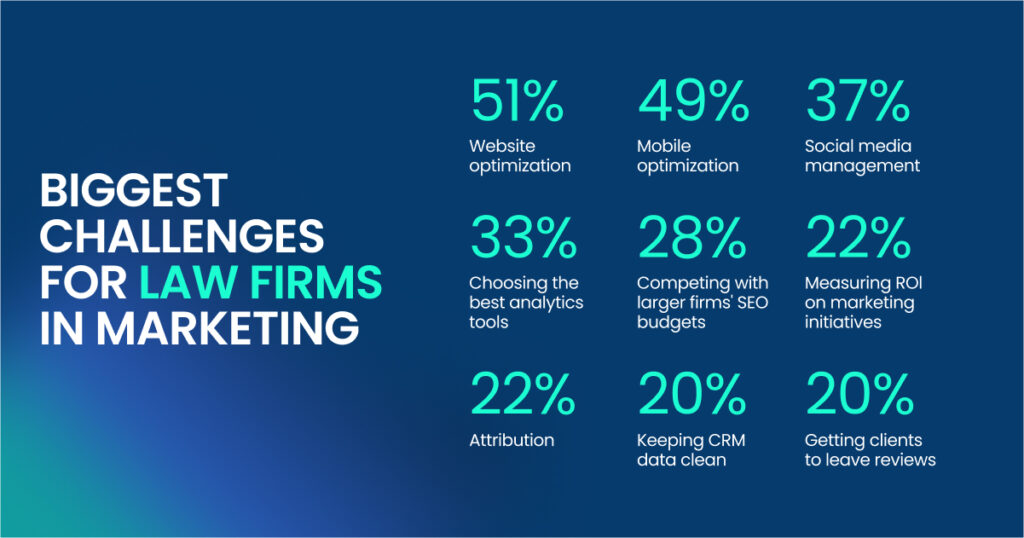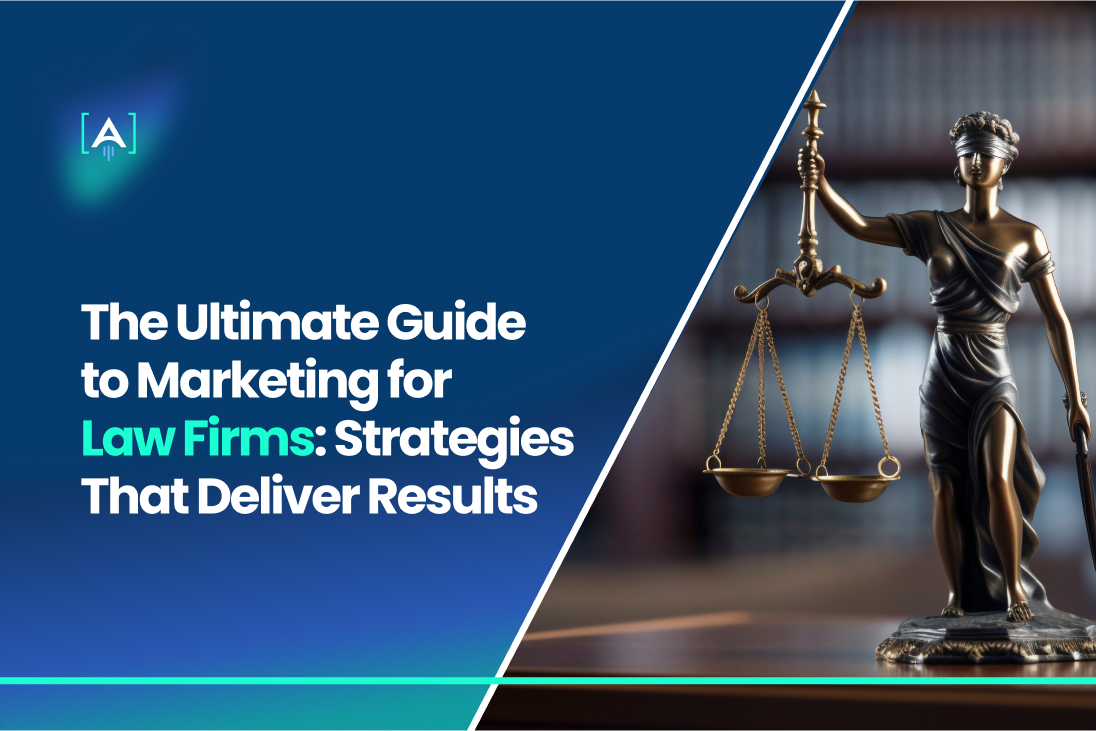Did you know that 77% of people looking for lawyers start their search online?
Most people turn to the web first when they need legal help.
This means if your law firm isn’t easy to find online, you’re missing out on many potential clients.
Having an online presence goes beyond having a website. It’s about making sure your site is the first one people find.

That’s where law firm SEO (search engine optimization) helps your site rank higher on Google.
Then, there’s social media, emails, and ads.
They all work together to keep your firm in people’s minds. When someone finally needs a lawyer, you’ll be the first name they think of.
This guide will reveal legal marketing strategies for establishing a strong online presence and fostering long-term relationships.
Crafting a Tailored Law Firm Marketing Plan

Let’s dive into an actionable law firm marketing plan for optimal results.
1. Smart Budget Allocation

The first step in effectively marketing for law firms is ensuring smart law firm marketing budget allocation.
Here’s a detailed guide on how to do it successfully:
- Define Your Legal Marketing Goals: Clearly define your law firm’s marketing objectives. Determine whether you want to attract new clients, increase brand awareness, or promote specific practice areas. Having well-defined goals will guide your budget allocation decisions.
- Understand Your Audience: Get to know your audience deeply: Dive into understanding your target demographic. Analyze their characteristics, preferences, and behaviors to pinpoint the best marketing for law firms channels and strategies to engage them effectively.
- Identify High-Impact Channels: Prioritize marketing channels offering law firms the greatest return on investment (ROI). This may include targeted online advertising, content marketing for law firms, social media outreach, or local SEO efforts tailored to your firm’s specialties and target locations.
2. Law Firm Website Optimization

When attracting potential clients online, having a robust website is crucial.
Your law firm website is all about ensuring your site is easy to find and use and showcasing your expertise effectively.
Website optimization comprises several steps.
Let’s look at them one by one:
Designing a User-Friendly Law Firm Website
Your website is the digital face of your law practice, so it’s essential to make a positive first impression.
- Choose a Clean and Modern Design: Apply a clean, professional design that reflects your firm’s branding and values.
Stick to clean layouts with plenty of white space, and avoid clutter or flashy graphics that might overwhelm visitors.
- Prioritize Mobile Responsiveness: Many people search for legal services on their phones, so your website needs to look good and work well on mobile devices.
Don’t make your potential clients zoom in and out just to read the text. Make sure it automatically adjusts to fit different screen sizes so potential clients can easily find what they need, whether on a smartphone or tablet.
- Implement Intuitive Navigation: As a lawyer, you organize your files into clearly labeled folders, and important information should be easy to find.
The same goes for your website. Use clear menu labels and organize pages logically so visitors can quickly find what they want.
- Include Prominent Contact Information: Your contact information is displayed in your office so clients can reach you easily.
Similarly, your website should prominently feature your contact details, making it simple for visitors to contact you.
- Optimize Page Load Speed: Clients in the legal field are often pressed for time and need quick access to information. That’s why it’s crucial to ensure your website loads swiftly.
Optimize images and files and invest in a dependable hosting service to prevent visitors from becoming frustrated and leaving your site before they’ve had a chance to explore what you have to offer.
- Incorporate Trust Signals: Your website should incorporate trust signals like client testimonials and professional affiliations.
These signals reassure visitors that they’re in capable hands.
- Test and Iterate: Your website is a work in progress. Regularly review your site’s performance, gather feedback from visitors, and make adjustments as needed.
Testing different layouts, content, and features helps you create the best possible user experience over time.
Website Content – Speak Your Legal Truth Online
Why it’s super important to make sure your law firm’s website shows up when people search for legal help online.
If someone’s looking for a lawyer, you want them to find you, right?
That’s where optimizing your website content with the right keywords and topics comes in.
Here’s what you need to know:
- Keyword Research: You must figure out or look at platforms like Ahrefs what people are typing into Google when they need a lawyer. For example, if you’re a personal injury attorney, you’d want to know what “car accident lawyer” or “slip and fall attorney” are famous.
- Incorporating Keywords Naturally: It’s not just about throwing those keywords everywhere – you need to weave them into your content smoothly. So, instead of saying, “Our firm is the best car accident lawyer in town,” you might say something like, “Our experienced team is here to help you after a car wreck.”
- Creating Relevant Content: Your website needs information that helps people. For example, if you’re a family law firm, writing articles about divorce, child custody, or prenups could be really helpful for people going through tough times.
- Engage with Compelling Homepage Content: Capture visitors’ attention with a welcoming homepage of your law firm’s website. Clearly communicate your firm’s mission and values. Use concise language and compelling images to convey professionalism and trustworthiness.
- Focusing on Long-Tail Keywords: Sometimes, it’s better to get specific. Instead of just saying “estate planning lawyer,” you might target phrases like “estate planning attorney for blended families” or “trusts and wills lawyer in [your city].”
- Optimizing Location-Based Keywords: If your small law firm works in a specific area, use keywords that mention that location. So, if you’re in Chicago, you’d want phrases like “Chicago criminal defense lawyer” or “Illinois DUI attorney” on your site.
- Establish Trust with Testimonials and Case Studies: Display feedback from clients and examples of successful cases to gain trust with prospective clients. Highlight positive experiences and successful outcomes to reassure visitors of your firm’s ability to deliver results.
4. Email Marketing for Law Firms – Nurture Client Connections

Now that you’ve crafted engaging website content, it’s time to maintain those connections through email marketing.
Here’s why it’s crucial and how to do it effectively:
- Build Email Lists: Just as you customize your website content to attract potential clients, your email marketing should also be tailored to their preferences.
For instance, if someone shows interest in family law services on your website, you can send them targeted emails about family law topics.
- Segment by the Stage: In addition to segmenting email lists based on client interests or practice areas, consider segmenting by the stage of the client journey.
For example, you can create lists for new leads and current and past clients, allowing you to tailor your messaging and offers accordingly.
- Personalize Content for Relevant Email Campaigns: Leverage the insights gained from your website to personalize your email content. Address recipients by name and deliver information directly addressing their legal concerns or interests.
This personal touch improves engagement and strengthens client relationships. Use dynamic content blocks within your emails to showcase personalized recommendations, such as relevant blog posts, upcoming events, or recent case results.
- Automate Follow-Up Sequences: By integrating email marketing with your website, you can automate follow-up sequences to nurture leads and maintain ongoing communication.
For instance, if someone downloads a legal guide from your website, you can set up automated emails to share more helpful information and encourage them to contact your firm.
- A/B Testing: Try different versions of subject lines, CTAs, or email formats to see what people like best.
For example, when sending out an email about an upcoming webinar on estate planning, you could test two different subject lines – one straightforward like “Join Our Estate Planning Webinar” and another more intriguing like “Secure Your Family’s Future: Free Webinar Inside!” Testing both lets you see which one gets more people to open your email.
- Monitor and Analyze Email Metrics: You must consider open, click-through, and conversion rates. Use this data to identify trends, optimize campaign performance, and refine your email marketing strategy.
5. PPC Platforms – Smart Advertising Investments
First, let’s understand what a PPC ad is.
Let’s say you’re a lawyer helping people with divorce cases.
With PPC ads, you create a digital billboard that appears in search engines when someone searches for “divorce lawyer” or “legal help with divorce.”
Clicking on your ad, they are taken to your website to learn more about your services.
Here’s why it works and how to get started:
- Set Clear Goals: Before you invest in PPC advertising, you must know what you’re aiming for and how much you’re willing to spend. Maybe you want more people visiting your website or more leads for your law firm.
Once you’ve sorted that out, set a budget that fits your goals and makes sense for your business.
- Choose the Right PPC Platforms: Platforms like Google Ads and Bing Ads let you show your ads to people actively seeking legal help. Pick the platforms that match your target audience and budget to make the most impact.
Say you’re a criminal defense attorney looking to reach those who need legal help after getting arrested. Google Ads and Bing Ads are perfect for this because they let you show your ads to those searching for terms like “criminal defense lawyer” or “DUI attorney.”
- Craft Compelling Ad Copy and Keywords: Write ads that grab attention and encourage clicks. Use keywords that match what people are searching for to ensure your ads appear in the right places.
For example, if your firm handles divorce cases, your ad could highlight your experience helping couples through difficult times. Some relevant keywords might include “divorce lawyer,” “family law attorney,” or “legal separation advice.”
- Monitor Competitor Activity: Say another law firm in your city handles similar immigration cases. You can check out their PPC ads to see what keywords they’re targeting and what their ad copy looks like.
For example, they might use phrases like “immigration lawyer near me” or “green card attorney” to attract clients. By analyzing their ads, you can get insights into what’s working for them and where you might be able to improve your own PPC campaigns.
- Keep an Eye on Performance and Adjustment: Consistently review the performance of your ads and improve them.
Look at how many people click on your ads and how many become clients. If something isn’t working, tweak your ads or targeting to make them more effective.
6. Content Marketing for Law Firms – Establish Your Legal Authority

Trust is key to getting noticed by potential clients. Content marketing helps build that trust.
Law firms can establish credibility, educate their audience, and attract and retain clients through informative and engaging content.
- Informative Blog Posts and Articles: Share valuable insights and legal advice through blog posts and articles. Cover topics relevant to your practice areas, answering common questions and addressing potential concerns your target audience may have.
For instance, if your firm focuses on personal injury law, you can create content discussing common types of injuries, steps to take after an accident, etc.
- Educational Whitepapers and E-books: Create in-depth resources that offer valuable information to your audience. Whitepapers and e-books allow you to dive deeper into complex legal topics, demonstrating your expertise and providing actionable advice.
For instance, you could develop a whitepaper outlining the legal requirements for starting a small business or an e-book offering tips for navigating the divorce process.
- Distribute Content Across Channels: Share your content across various channels to maximize its reach and engagement.
In addition to publishing on your website, promote your blog posts, articles, whitepapers, and e-books through social media platforms, email newsletters, and industry forums.
7. Social Media Presence for Law Firms
Social media has become a powerful tool for law firms to connect with their audience, showcase expertise, and attract potential clients.
Here are some key strategies to maximize social media engagement for your law firm:
- Identify the Right Platforms: Choose social media platforms where your target audience is most active. For example, a personal injury law firm might find success on platforms like Facebook and Instagram, where they can share informative content and engage with potential clients seeking legal advice after accidents.
- Engage with Your Followers: Never leave a comment or message unanswered. If someone seeks advice on estate planning in the comments, offer them valuable insights and extend a personalized invitation to schedule a consultation, tailoring your response to their needs.
8. Video Marketing – Connect Through Visual Storytelling
Another aspect of law firm marketing strategy is video marketing.
Video marketing is a dynamic way to engage with potential clients and showcase your firm’s personality.
Here’s how to leverage it effectively:
- Film Legal Explainer Videos: Create short videos that simplify complex legal concepts and explain common legal procedures. For instance, you could produce videos explaining the steps in filing a personal injury claim or demystifying the probate process.
- Showcase Attorney Profiles and Client Testimonials: Introduce your team members through video profiles. This allows potential clients to get to know the faces behind your firm. Additionally, feature client testimonials in video format to provide social proof of your firm’s capabilities and successes.
- Host Live Q&A Sessions and Webinars: Interact with your audience by hosting live question-and-answer sessions or webinars on legal topics of interest. This allows you to address common concerns, provide valuable insights, and establish your firm as a trusted authority in the legal field.
9. Law Firm SEO

When it comes to SEO for law firms, it’s all about ensuring your website shows up when people search for legal help.
- Optimize on-page elements: The title tags, meta descriptions, and headings tell search engines what your website is all about.
For example, if you’re a personal injury lawyer in Los Angeles, your title tag might say something like “Los Angeles Personal Injury Attorney | Smith Law Firm.” This tells both search engines and potential clients exactly what you do and where you do it.
- Building High-Quality Backlinks: For instance, if a reputable legal website links to your blog post about recent changes in immigration law, it tells Google that your content is valuable and trustworthy.
Now, let’s zoom in on Local SEO:
Local SEO – Dominate Your Local Legal Market
Local SEO is essential for law firms looking to attract clients in their geographic area.
Here’s how to make sure your firm stands out:
- Optimize Google My Business Profile: Ensure your Google My Business profile is fully optimized by providing correct contact details, operating hours, and a summary of your legal offerings. Encourage happy clients to share positive reviews, improving your presence in local search listings.
- Generate Positive Reviews and Manage Reputation: Actively request reviews from satisfied clients and promptly address any negative feedback. Positive reviews improve your firm’s reputation and increase rankings in local search results. Monitor your online reputation across review platforms and respond professionally to all feedback, showcasing your firm’s commitment to client satisfaction.
- Implement Location-Based Keyword Strategies: Incorporate location-specific keywords into your website content, meta tags, and headings to improve your visibility in local search queries. For example, include the name of your city or neighborhood alongside your primary practice areas.
10. Online Directories and Legal Listings
Being listed in these directories increases visibility and builds credibility and trust among prospective clients.
Let’s explore why online directories and legal listings are essential tools for legal professionals:
- Submitting to Directories: Directories are like digital phonebooks for finding lawyers. They’re where people go when they need legal help. You’ll want to make sure your law firm is listed in the right directories.
Depending on your practice area and location, you might list your firm on directories like Avvo, FindLaw, or Justia.
- Keep Consistency: When you’re listed in these directories, keeping your info consistent is crucial.
That means ensuring your name, address, and phone number (NAP) are the same everywhere. Imagine someone finds your firm on one directory but then can’t reach you because the phone number is different on another site.
- Reviews Matter: Positive reviews can be like gold for your law firm. They’re like personal recommendations from satisfied clients.
So, encourage your past clients to leave reviews on platforms like Google My Business, Yelp, or Facebook.
11. Referral Programs
Referral programs are like friendly nods from satisfied clients.
They guide others toward your legal services.
Here’s how you can organize them:
- Building Partnerships: You can team up with other businesses that complement yours, like financial advisors or real estate agents. Together, you can refer clients to each other, like a trusted network.
The important thing is to find partners who serve the same audience but offer different services. For example, if you’re a family lawyer, you might partner with a therapist or a mediator.
- Incentivizing Referrals: You can reward your current clients for sending new business your way. It’s like saying, “Thanks for spreading the word about us!”
Similar to discounts on future services, gift cards, or even free consultations. It’s a win-win – your clients get something in return, and you get new business.
12. ROI Analysis
ROI, or return on investment, is like figuring out if your marketing efforts are paying off.
It’s all about seeing how much you’re getting for your law firm spend.
You calculate ROI by comparing what you’re spending on marketing to what you’re getting back in terms of new clients or revenue.
- Comparing Costs and Benefits: You want to see which marketing channels are giving you the juiciest fruit. Maybe you’re spending a lot on Google Ads but getting most of your clients through referrals.
By looking at the costs and benefits of different marketing campaigns, you can figure out where to focus your efforts and budget.
- Adjusting Strategies: Once you’ve crunched the numbers, it’s time to make adjustments.
If you’re seeing a high ROI from your email marketing but not so much from social media ads, you might shift some of your budget around.
How to Measure Your Law Firm Marketing Efforts

As your law firm’s marketing strategy nears its end, it’s crucial to assess the effectiveness of your efforts.
Let’s say you’ve implemented all these marketing strategies for your law firm – from SEO to social media, PPC, and more.
How do you know if all those blog posts, social media posts, and ad campaigns bring in clients and grow your business?
Final Steps
- Monitor essential metrics such as website traffic, leads generated, and conversion rates to gauge the effectiveness of your marketing campaigns.
- Use analytics tools to evaluate individual marketing channels’ performance and pinpoint improvement areas.
- Regularly reassess your marketing budget allocation and make adjustments based on the ROI of each strategy.
- Collect feedback from clients to assess their satisfaction with your firm’s marketing initiatives and uncover opportunities for improvement.
- Stay updated on industry trends and competitor actions to adjust your marketing strategies proactively and sustain a competitive advantage.
Do You Need a Law Firm Marketing Agency?

Law firms can’t afford to miss out on potential clients.
One-fourth of law firms fail to monitor their leads.
Without dedicated marketing experts, they risk losing valuable opportunities to attract new clients and grow their business.
[A] Growth Agency can make all the difference.
We dedicate a team of experts to your law firm, specializing in effective marketing for law firms strategies, and promoting your law firm online.
We integrate into your team, working closely with you to achieve your marketing goals, including social media marketing and digital marketing strategies.
Boosting Your Law Firm’s Marketing

In the world of law, getting noticed is key.
This guide offers tips on how to boost your firm’s online presence, attract clients, and build lasting relationships.
Keep tweaking and improving as you go.
It’s worth investing in marketing for law firms; teaming up with pros like [A] Growth Agency can make a big difference.
Your firm can stand out and thrive in the digital age with the right strategies.

